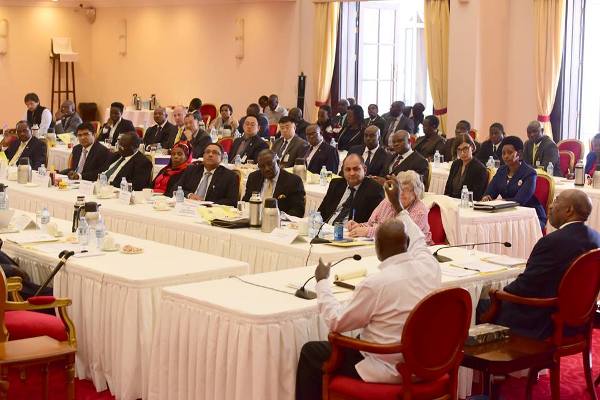EAC – signing ceremony of the treaty of accession by the DRC – 8th April 2022 – 02
The East African Community (EAC) is embarking on the process of Somalia’s application to join the bloc as its eighth member, after completing the admission of the Democratic Republic of Congo (DRC).
The intergovernmental organisation now has seven member states which include Uganda, the Republic of Burundi, Kenya, Rwanda, South Sudan, the United Republic of Tanzania and the Democratic Republic of Congo. Somalia last applied to join the EAC bloc in 2017 after its initial application was rejected a year earlier over political volatility.
According to the EAC treaty, adherence to universally acceptable principles of good governance, democracy, the rule of law, observance of human rights and social justice are key requirements for admission. The other conditions include contributions towards the strengthening of integration within the East African region; geographical proximity to and inter-dependence between it and the Partner States, as well as the establishment and maintenance of a market-driven economy.
But EAC Secretary-General Peter Mathuki says they are now considering a verification mission to Somalia to consider the Horn of Africa’s application and ascertain whether the country is ready to join the EAC. Dr Mathuki was giving an update following the last Heads of States Summit and the subsequent official admission of the DRC.
The other country that had applied to join the bloc earlier was Sudan in 2011, but its application was put on hold as there was already a process for the Southern region to secede. This meant that the North would have no common border with the EAC, which is otherwise one of the first requirements. However, following the Admission of South Sudan, the Republic of Sudan has never shown interest in joining the bloc.
Simon Peter Owaka, the Senior Public Relations at the EAC Secretariat says the EAC does not solicit the membership of countries to join, but that the door is open, provided they meet the requirements.
Meanwhile, the Secretary-General says he supports the Democratic Republic of Congo’s proposal of an EAC body that is mandated to monitor and regulate the exploitation of natural resources. DRC President Felix Tshisekedi has consistently stated this as a move toward protecting the resources in the region for the benefit of the citizens and wants the agency to be headquartered in his country.
Mathuki welcomes the idea and says basing it in the DRC will create equality because regional agencies are spread all over all the six partner states, with Uganda having two; the Lake Victoria Fisheries Organisation and the Inter-University Council of East Africa. He however says the mandate to approve its creation lies with the presidents.
Mathuki reiterated the importance of the EAC membership to the DRC but said the focus should be put on ending insecurity in the DRC and other countries for trade to be smooth. He noted a proposal to institute a commission of eminent persons to advise on how DR Congo’s Eastern region could be pacified. But above all, Mathuki said there are many advantages for the DRC in belonging to the EAC, especially having easy and cheap access to the seaports of Mombasa and Dar-Es-Salaam.
On Travel, the Secretary-General assured the Congolese Citizens that they will be able to travel to other countries without requiring a visa or passport as is the case between Uganda, Rwanda and Kenya and recently South Sudan. However, this is initiated by the countries and usually on a reciprocal basis.
One of the requirements that the DRC will have to embark on is the introduction of the East African Community electronic passport. Most countries have started issuing the passport, and are expected to have phased out the old national passports by the November 2022 deadline.
Amidst this process, however, major challenges still face the bloc. These include financing, security, cross-border relations and internal politics in member-states. Two countries, Burundi and South Sudan are in arrears worth more than 50 million US Dollars in annual contributions to the EAC Secretariat, which has put a budgetary strain on the operations of the bloc.
This amount is about half of the bloc’s annual financial needs and more than half of the 91 million US Dollars budget that was presented to the parliament last week. At the 19th Extra-Ordinary Summit of the EAC Heads of State, South Sudan promised to start clearing her arrears after it is done with the implementation of the peace agreement that could lead to presidential elections next year.
The Secretariat now expects 37 million US Dollars from all the partner states next financial year, despite the requirement that each contributes 7.3 million US Dollars. As of February, Uganda, Kenya, Rwanda and Tanzania had fully paid up.
As DR Congo joins, the Secretary-General, Pether Mathuki says they will continue supporting the members to clear their arrears, and have no intention of excluding them from programs, despite the strain on the budget.
-URN





